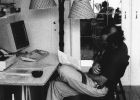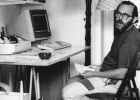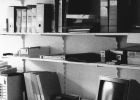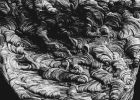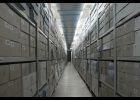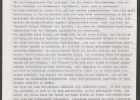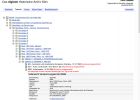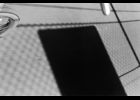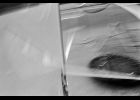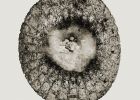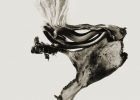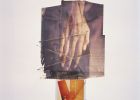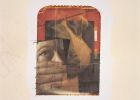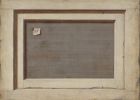Flusser Studies 24 – December 2017 / Special Issue: Archiving Flusser
Part I: Archiving Flusser
Gedächtnisstützen I / Gedächtnisstützen II / Gedächtnisse / Das Gedächtnis / On Memory /Memoria I / Memoria II / La mémoire
Flusser hören – lesen – studieren. Der "Flusser-Hypertext" – von der Nachgeschichte zur Vorgeschichte
On March 2, 1989, Vilém Flusser gave a lecture at the Institute for Technology Assessment and Systems Analysis. At the time, the Institue was part of the former Research Centre Karlsruhe, located in Eggenstein-Leopoldshafen, and today it is part of the Karlsruhe Institute of Technology—KIT. The topic of the lecture was “Writing for Publishing” and fitted well into the research project under study at that time: Electronic Publishing. In a subsequent project on Electronic Books, we took this lecture as the basis of a hypertext offering users three modes of getting acquainted with Flusser’s ideas: Listening to his recorded speech, reading the transcript, and studying in detail his arguments by following the links into an extended system of explanations, ordered in three layers “beneath” the text. There is a publication (in German) that describes this hypertext and two other prototypes (Böhle et al. 1997). The author goes back to the old files and tries to unfold the obvious and hidden rational of this prototype. At the end, he dares to dream of a science fiction in which Vilém Flusser is a member of the research project, therefore exploring (and suffering) with colleagues, new writing and reading technologies. What kind of Flusserian philosophy would have emerged then?
MaHiPo -Vom Worte-Schlagen durch den Texte-Dschungel
Vera Schwamborn was instrumental in setting up the first Vilém Flusser Archive in The Hague in the late summer of 1992. Flusser’s son Miguel travelled every two months to the Netherlands to assist the electronic implementation of the project. Schwamborn developed a comprehensive list of 172 keywords (see Keyword-Manual February 1993) that is still of great interest for a broader understanding of Vilém Flusser’s thinking.
Materialien
Flusser-Quellen: Eine kommentierte Bibliografie Vilém Flussers
The Flusser-Quellen (Flusser sources) was originally conceived as the first volume of Andreas Müller-Pohle’s Flusser Editions, which should have been published by European Photography in 1996/1997. Klaus Sanders continued working on the text until 2002. The final revised edition, with a new foreword by Daniel Irrgang, has now finally been made accessible on-line by the Vilém Flusser Archive in Berlin (http://s3.amazonaws.com/arena-attachments/1485097/d85714e287d539db39da46f0e5198b20.pdf?1512484296).
Flusser-Quellen. Teil I: Vorwort des Vilém Flusser Archivs, Oktober 2017
Flusser-Quellen (Flusser-Sources) is a comprehensive list of all of Vilém Flusser’s texts published between 1960 and 2002. It includes essays, book chapters, books CDs in seven different languages. It also contains a list of all interviews and videos directly related to his person and his work. Flusser-Quellen was developed by Klaus Sander in collaboration with the Vilém Flusser Archive and Andreas Müller-Pohle’s European Photography. The original plan was to publish this material as a volume of Müller-Pohle’s Editions of Flusser, together with a CD-ROM version. The material can be accessed here: http://s3.amazonaws.com/arena-attachments/1485097/d85714e287d539db39da46f0e5198b20.pdf?1512484296
Die Flusser-Files
Flusser Files was the very first Internet site in Germany dealing with Vilém Flusser’ work. It went online as early as 1998. Among other things, it contains the hypertext by Reinhold Grether “Weltrevolution nach Flusser,” and a comment on a Flusser Symposium held in March 1999 in Puchheim, Germany, written by Bernd Wingert and Rainer Guldin in German and Italian (http://www.claudia-klinger.de/flusser/).
(Re-)Archiving Flusser
The Vilém Flusser Archive at the Berlin University of the Arts (http://www.flusser-archive.org/) holds and looks after the literary remains of the cultural theorist and philosopher Vilém Flusser. The archive identifies itself as an intersection in international research on Vilém Flusser, and endeavors to enhance accessibility to the work of this influential thinker. The aim of this article is to give a general overview on the individual collection of the archive and to describe its connections to the “mirror” archive in São Paulo and the Historical Archive of the City of Cologne. Among other topics, the authors of this paper report on the current situation of the digitization process of the Vilém Flusser Collection at the Cologne archive, while reflecting on future questions.
MagmaMater
This site was born in 2010 as a resource for the students of the Universidad Austral de Chile in Valdivia. It was first called Flusser Estudios: La red Flusseriana de Chile. The site contains among other texts by Vilém Flusser, the transcripts of the Bochumer Vorlesungen of 1991, a series of Spanish translations, a bibliography of his work, as well as five videos (http://www.magmamater.cl/flusser/).
FlusserBrasil
FlusserBrasil was a virtual space for the preservation and dissemination of Vilém Flusser’s work. Its major goal was to make his texts available and to promote the publication of his work in Brazil and worldwide. The site has been recently discontinued (February 11, 2024).
Performing the Archive and Vilém Flusser
This text reviews the three phases of my research on the theme of the archive and in relation to Vilém Flusser. The first phase or direction examined the work of artists, mostly Brazilian, who destabilized the archive by creating fluid boundaries between their artworks, their writings, and the archives they created in order to historicize the movements they participated in. These reflections are included in my book Performing the Archive from 2009. The second direction is made up of two collaborations at Penn State University in the context of the digital humanities. These creative projects—a video and a sound performance—were developed with designers, scientists, and musicians between 2012 and 2013. The third phase, still unfolding, focuses on the fluid boundaries between the subject and the object of research, especially in decolonial practices, histories, and methodologies. In every instance, insights into the archive stemmed primarily from the dialogue with artists, but also from the exploration of a few curators and theorists, including Flusser.
Part II: On Photography
Flusser et les photographes, les photographes et Flusser / Flusser and photographers, photographers and Flusser / Flusser e os fotógrafos, os fotógrafos e Flusser
The concept of experimental photography has rarely been defined, nor has it been the subject of much research in studies of contemporary photography. Vilém Flusser is one of the few writers who, in his book Towards a Philosophy of Photography, proposed a definition of experimental photography as “playing against the apparatus”, i.e. the practice of some photographers who do not abide by the rules of photography and perturb the standard operations of the apparatus by playing against the camera. Aside from this conceptual definition, Flusser himself gave few examples of this practice, principally Andreas Müller-Pohle and Joan Fontcuberta. While expanding this definition, this essay sheds light on contemporary photographers whose work can be qualified as experimental in this respect. Some deconstruct the camera, reinventing it or photographing without a lens (pinhole) or even without a camera (photograms). Some undo the image creation process, playing with time, with light, with the chemical development process or with image printing. And some redefine the author-photographer, erasing him or giving him a different role in the photographic process. Contemporary experimental photography is not a school, nor a movement, but simply a current, a moment between the decline of traditional documentary analog photography and the rise of digital photography.


